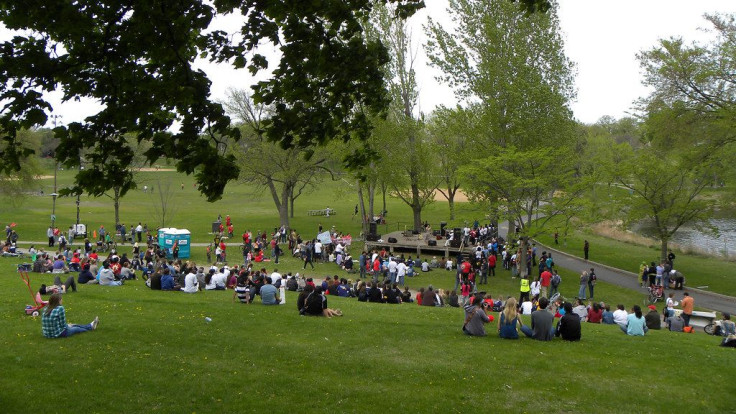Minneapolis Community Shuns Police, Sees Park Become Homeless Camp And Drug Peddling Zone

KEY POINTS
- The neighborhood around Powderhorn Park in Minneapolis has become a homeless camp
- Crimes like drug peddling, prostitution, property damage and armed robberies are on the rise
- Its mostly white liberal residents refused to call the cops as protest against the killing of George Floyd
A community in Minneapolis, where residents vowed not to call the police for local grievances as a protest against the death of George Floyd, is reportedly facing a law and order problem after 300 homeless people turned their local park into a camp and drug peddling zone.
Dozens of homeless tents were reportedly erected at Powderhorn Park, which is populated with white liberal residents.
The New York Times reported drug peddling, prostitution, property damage, armed robberies and other crimes are on the rise in this Minneapolis community.
Some residents reported being catcalled and harassed, while others have avoided bringing their kids and dogs to the park because it is no longer safe.
Looking to help at the Powderhorn Park Sanctuary? Sign up to help with meals, volunteer shifts, or supply donations here:https://t.co/lBQ4dkmRLf pic.twitter.com/GRbiPYUmLQ
— PPNA (@PowderhornMpls) June 15, 2020
"I am afraid," resident Shari Albers said. "I know my neighbors are around, but I'm not feeling grounded in my city at all. Anything could happen."
Another resident, Mitchell Erickson, said he was cornered by two Black teenagers near his home with a gun to his chest, demanding his car keys. Erickson admitted he broke the neighborhood's vow and dialed 911 but immediately regretted doing so because he may have "put those boys in danger of death."
"I haven’t been forced to think like this before," Erickson said.
Following Floyd's killing on May 25, the Minneapolis City Council moved to defund its police department and promised to establish a new public safety model where social workers and community groups, such as the American Indian Movement, would deal with the problems of neighborhoods, instead of the cops. This group has been dealing with issues of poverty, police brutality and racism since 1968, per Fox News.
Meanwhile, the Minneapolis Parks and Recreation Board (MPRB) allowed public parks to be used as a refuge in the wake of the continuing protests in the streets of Minneapolis. However, despite providing services like restrooms, portable showers and electricity, the MPRB said it does not have the capacity and "adequately trained" staff to deal with other issues that have emerged from these encampments.
On Wednesday (June 24), U.S. Attorney for Minnesota Erica MacDonald met with the city's Police Chief Medaria Arradondo, Hennepin County Sheriff Dave Hutchinson, Bureau of Criminal Apprehension Superintendent Drew Evans and other federal law enforcement agencies to address the increasing crime problems.
"I cannot really talk about it right now but we met with the U.S. Attorney's Office and we are always here to assist local law enforcement across Minnesota whenever violent crime is happening," Evans confirmed.
© Copyright IBTimes 2025. All rights reserved.





















